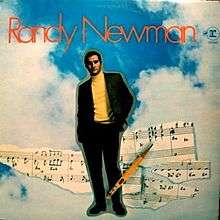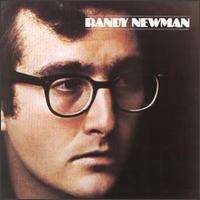Randy Newman (album)
| Randy Newman | ||||
|---|---|---|---|---|
 Original LP cover | ||||
| Studio album by Randy Newman | ||||
| Released | June 1968 | |||
| Recorded | 1968 | |||
| Length | 27:24 | |||
| Label | Reprise | |||
| Producer | Lenny Waronker, Van Dyke Parks | |||
| Randy Newman chronology | ||||
| ||||
| Singles from Spring | ||||
|
||||
| Revised cover | ||||
 |
||||
Randy Newman is the debut recording by Randy Newman, released in 1968. Unlike his later albums which featured Newman and his piano backed by guitar, bass guitar and drums, Randy Newman was highly orchestral and aimed to blend the orchestra with Newman's voice and piano.
Randy Newman never dented the Billboard Top 200 and was not received as well by critics as Newman's acclaimed 1970s albums 12 Songs, Sail Away and Good Old Boys; indeed, according to Ken Tucker, the album sold so poorly that Warner offered buyers the opportunity to trade the album for another in the company's catalog.[1]Randy Newman was out of print for over 15 years until it was re-released on CD in 1995. It was remastered by Lee Herschberg.
The album is sometimes referred to as Randy Newman Creates Something New Under The Sun, which was written on the reverse of the album sleeve.[2][3]
Details
Newman later commented on the lack of influence from rock and roll on the album. "It's like I'd never heard The Rolling Stones. I thought you could move things along just with the orchestra, that it was somehow cheating to use drums. What Van Dyke and I–and Harry Nilsson, to some degree–were doing, it was like a branch of homo sapiens that didn't become homo sapiens. Homo erectus," he said.[4]
Reception
Critic Ellen Willis said the songs on the album, "show an intimate familiarity with, and an affection for, all the nuances of American life - the setting and characters, the family relationships, the romantic fantasies, the euphemisms - as well as an unsparing awareness of our oppression of old people, fat people, and other nonmainstream types."[5]
AllMusic claimed Newman's lyrics were, "intent upon taking clichés and using them to satirize social conventions, a popular parlor game in the late '60s." Overall the album was considered, "an audacious first album by a major, if extremely quirky, talent."[6] Rolling Stone noted, "the mood of a bitter longing for affection that characterizes the album."[7]
Previous versions of songs on this album
As with many of Newman's early albums, several Newman-penned songs had been previously recorded by other artists.
- "I Think It's Going to Rain Today", was originally recorded and released by Julius LaRosa in 1966. It had also been covered in 1966/67 by Judy Collins, Eric Burdon, and others.
- "Living Without You" was issued as a single (under the title "So Hard Living Without You") by Keith Shields in February 1967.
- "Love Story" was released as a single by The Brothers in August 1967. It was also recorded by Peggy Lee (1970 single), Harry Nilson, on Nilsson Sings Newman and Liza Minnelli, on Come Saturday Morning.
- "So Long Dad" was released as a single by Manfred Mann in September 1967.
- The Alan Price Set issued recordings of "Living Without You", "Bet No One Ever Hurt This Bad" (as "No One Ever Hurt So Bad") and "So Long Dad" on their 1967 album A Price On His Head.
Singles
"I Think It's Going to Rain Today" b/w "The Beehive State" was issued as a single on Reprise 0284. Reprise also issued this single on a promotional 10" vinyl 78 rpm record as the first (and only) release under their proposed "Reprise Speed Series" of 78 RPM releases (the series was discontinued by Reprise due to a lack of interest and sales a few months after this release).[8]
Reception
| Professional ratings | |
|---|---|
| Review scores | |
| Source | Rating |
| AllMusic | |
| Rolling Stone Album Guide (1992) | |
Track listing
All songs written and arranged by Randy Newman.
- "Love Story (You and Me)" – 3:20
- "Bet No One Ever Hurt This Bad" – 2:00
- "Living Without You" – 2:25
- "So Long Dad" – 2:02
- "I Think He's Hiding" – 3:04
- "Linda" – 2:27
- "Laughing Boy" – 1:55
- "Cowboy" – 2:36
- "Beehive State" – 1:50
- "I Think It's Going to Rain Today" – 2:55
- "Davy the Fat Boy" – 2:50
Personnel
- Randy Newman - vocals, piano
- Anthony Terran - trumpet
- Herb Ellis - guitar
- Jim Horn - saxophone
- Plas Johnson - saxophone
- Larry Knechtel - guitar, bass
- Carol Kaye - bass
- Al Casey - guitar
- Milt Bernhart - trombone
- Mike Deasy - guitar
- Ron Elliott - guitar
- Lyle Ritz - bass
- Jim Gordon - drums
- Tommy Morgan - harmonica
- Ray Kelley - cello
- Ted Nash - saxophone
- Don Bagley - bass
- James Burton - guitar
- Israel Baker - violin
- Arnold Belnick - violin
- Harold Bemko - cello
- Harry Bluestone - violin
- Samuel Boghossian - viola
- Gene Cipriano - saxophone
- Gary Coleman - percussion (including mallets)
- Nick DeCaro - piano, accordion
- Frank DeCaro - guitar
- James A. Decker - French horn
- David Duke - French horn
- Carl Fortina - accordion
- Frederick Seykora - cello
- James Getzoff - flute
- Joe Gibbons - guitar
- William Green - saxophone
- Richard Hyde - trombone
- Armand Karpoff - cello
- Louis Kievman - viola
- William Kurash - violin
- Michael Lang - piano
- Don Lanier - guitar
- Gary LeVant - harmonica
- Tommy LiPuma - engineer
- Leonard Malarsky - violin
- Lew McCreary - trombone
- Jay Migliori - saxophone
- Sid Miller - saxophone
- Ollie Mitchell - trumpet
- Louis Morell - guitar
- Richard Perissi - French horn
- William R. Perkins - saxophone
- Jerome Reisler - violin
- Victor Sazer - cello
- Ralph Schaeffer - violin
- Wilbur Schwartz - saxophone
- Leonard Selic - viola
- Sid Sharp - violin
- Tommy Tedesco - guitar
- Sal Valentino - guitar, vocals
- Tibor Zelig - violin
- Hubert Anderson - percussion (including mallets)
- Joseph DiFiore - viola
- William Hinshaw - French horn
- Thomas Scott - saxophone
- Harold Ayties - viola? Será?
- Jesse Emrlich - cello
- Elizabeth Ershoff - harp
- David Filerman - cello
- Gene Garf - piano, organ
- Jan Hlinka - viola
- Norman Jeffreis - drums
- Gordon Pope - saxophone
- James Rowles - piano
- Joseph Tullio - cello
- William Weiss - violin
- Robert Knight - trombone
References
- ↑ Rolling Stone History of Rock & Roll 1986, p. 475.
- ↑ Kevin Courrier, Randy Newman's American Dreams, ECW Press, 2005, p.119
- ↑ William Ruhlmann, Review of Randy Newman, Allmusic.com. Retrieved 21 November 2015
- ↑ Keith Phipps (8 October 2003). "Randy Newman". A.V. Club.
- ↑ Ellen Willis (2011). Out of the Vinyl Deeps. University of Minnesota Press. p. 105. ISBN 978-0-8166-7283-7.
- ↑ William Ruhlmann. "Randy Newman". allmusic.
- ↑ Bruce Grimes (16 April 1970). "Randy Newman: 12 Songs". Rolling Stone.
- ↑ Billboard Magazine, November 23, 1968, "Reprise KO's 78's"